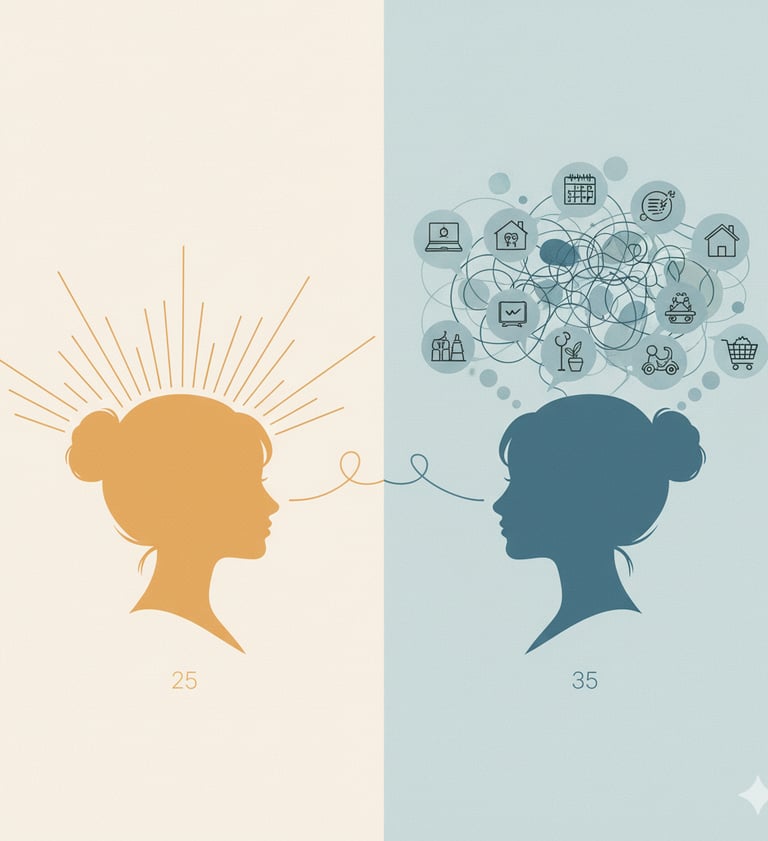Why Women Over 30 Can't Lose Weight (And It's Not What You Think)
"Tired of doing 'everything right' with no results? The problem isn't your willpower—it's your hormones, stress, and outdated advice. Discover what actually works."


My post content
Why Women Over 30 Can't Lose Weight (And It's Not What You Think)
By Gift Moralo, M.A. Behavioral Psychology | The guy who figured out why brilliant women can't crack the weight loss code
Meet Sarah. Thirty-four years old, marketing director. Two kids under eight. She's been showing up to the gym religiously for six months straight.
Meal preps every Sunday. Chugs water throughout the day. Takes her vitamins. Does everything right.
Still carrying around those 30 pounds that appeared between kid number two and her promotion.
Her trainer keeps saying "just stay consistent." Her doctor ran every test—everything's "normal." Her friends suggest she's not trying hard enough.
Sarah's wondering if her body just gave up on her.
Here's what might tick off every fitness influencer: Sarah's body isn't broken. The advice she's following is.
"Your body isn't broken. Your approach just needs to match your reality."
The Real Problem: Your Hormones Are Working Against You
What Happens to Your Body After 30
The hormone reality:
Estrogen decline → less fat burning, more fat storage (especially belly fat)
Cortisol elevation → survival mode kicks in, holds onto weight
Sleep disruption → hunger hormones go haywire
After thirty, estrogen begins its gradual decline. Your body gets less efficient at burning fat and more efficient at storing it, particularly around your midsection.
Meanwhile, your cortisol levels are running higher from work stress, family demands, and that group chat that never stops pinging. Elevated cortisol specifically tells your body to hang onto abdominal fat.
This isn't vanity weight—it's survival mode.
This is exactly why my 90-Day Plan includes cycle-based tracking that works with your hormonal reality, not against it.
The Decision Fatigue Connection
You're making 200+ micro-decisions daily. Which emails to answer first. What groceries to buy during your lunch meeting. How to handle another scheduling conflict.
Your prefrontal cortex—the same area responsible for willpower—runs on empty by evening.
So you eat perfectly all day. Then 8 PM hits and you demolish an entire sleeve of cookies.
This isn't lack of discipline. It's cognitive depletion.
That's why I built stress and energy tracking into my plan—so your food choices don't collapse at 8 PM.
What Everyone Gets Wrong About Exercise and Diet
The High-Intensity Exercise Trap
Here's the problem: HIIT workouts might be making weight loss harder for stressed women over 30.
If you're already dealing with elevated cortisol, adding intense physical stress can push you into chronic cortisol elevation.
Result:
Body holds onto fat more aggressively
Recovery suffers
You feel exhausted despite "doing everything right"
The "Eat Less, Move More" Lie
The diet industry's playbook triggers metabolic adaptation so quickly that you gain weight the moment you eat normally again.
Your metabolism isn't "slow"—it's protective.
You've been under-eating while over-exercising while chronically stressing. Your body learned to operate on fewer calories and won't abandon that survival strategy easily.
The restrict-binge cycle: You're "perfect" all day, then lose control at the office birthday party. But this isn't willpower—it's biology fighting restriction.
The Hidden Weight Loss Blockers
What Nobody Talks About
Medications that affect weight:
Birth control pills
Antidepressants
Blood pressure medications
Even allergy medications
Chronic inflammation from stress and poor sleep makes weight loss significantly harder. Your gut health suffers, affecting nutrient absorption and mood regulation.
Early hormonal shifts begin in your early thirties, years before obvious perimenopause symptoms appear.
What Actually Works for Women Over 30
Work With Your Hormonal Patterns
Instead of fighting your cycles, track them:
Week 1-2: Higher energy, can handle more intense workouts
Week 3: Energy starts declining, focus on moderate exercise
Week 4: Natural hunger increases, eat accordingly
This isn't inconsistency—it's intelligent adaptation.
Stress Management Before Perfect Nutrition
Managing stress will impact your weight more than perfecting your macros.
When cortisol stays elevated, your body fights weight loss regardless of how clean your diet is.
Practical steps:
Set work availability boundaries
Delegate daily micro-decisions
Prioritize sleep over 5 AM workouts when you're exhausted
Pattern Recognition Over Generic Plans
Success comes from understanding your unique patterns:
When do you make worst food choices?
What triggers cravings?
How does energy fluctuate with your cycle?
Sarah's breakthrough: She discovered her worst eating days followed nights when work stress kept her up past 11 PM. Once she connected that pattern, she could plan better recovery strategies.
Maria's discovery: Her energy crashed with morning workouts the week before her period. Switching to gentle movement during that week changed everything.
This pattern recognition approach is built into every page of my 90-Day tracking system.
Quick Answers to Common Questions
Why is weight loss harder after 30?
Hormonal changes, increased cortisol from stress, and metabolic adaptation make traditional methods less effective.
What's the best approach for women over 30?
Focus on stress management, work with hormonal cycles, track personal patterns, and use gentle consistency.
How long before seeing results?
Most women report energy improvements within 2-3 weeks, weight changes typically follow 4-6 weeks later.
The Bottom Line
Your weight loss struggles aren't a personal failing. They're the result of trying to apply advice designed for different bodies and life stages to your complex reality.
The solution isn't another diet or workout plan. It's developing systems that help you understand your unique patterns—hormonal fluctuations, stress responses, energy cycles.
This is where structured tracking becomes powerful. Not obsessive calorie counting, but intelligent pattern recognition based on actual data.
"Generic plans fail, but personalized patterns work."
Ready to Understand Your Patterns?
My 90-Day Fitness Plan for Women 30+ includes comprehensive tracking tools designed for your hormonal and lifestyle reality:
What's inside:
Cycle-synced tracking that works with your hormones
Decision fatigue protocols to protect your evening willpower
Energy pattern recognition tools most women never discover
Stress management strategies that actually impact weight loss
Tired of your willpower crashing by 8 PM?
Uncover the hidden cost of the 200+ decisions you make every day and get a personalized plan to reclaim your energy—in less than 3 minutes.
You didn’t come this far to only come this far. Keep going.
You didn't come this far to only come this far. Keep going.

